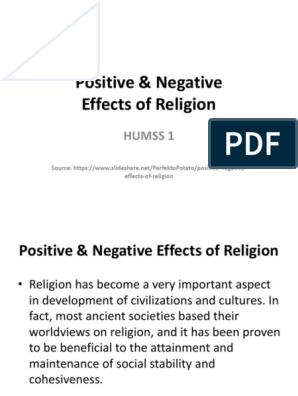0% found this document useful (0 votes)
12 views16 pagesPositive Negative Effects of Religion - 062940
The positive and negative effects of religion
Uploaded by
josferljeanbCopyright
© © All Rights Reserved
We take content rights seriously. If you suspect this is your content, claim it here.
Available Formats
Download as PPTX, PDF, TXT or read online on Scribd
0% found this document useful (0 votes)
12 views16 pagesPositive Negative Effects of Religion - 062940
The positive and negative effects of religion
Uploaded by
josferljeanbCopyright
© © All Rights Reserved
We take content rights seriously. If you suspect this is your content, claim it here.
Available Formats
Download as PPTX, PDF, TXT or read online on Scribd
/ 16























































































